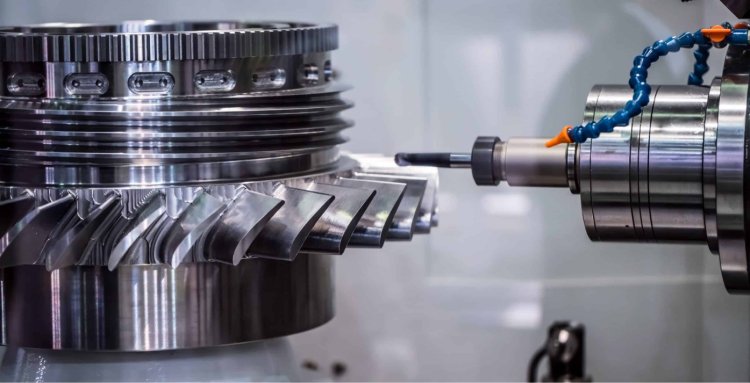Comprehensive CNC Machining Solutions for Today’s Manufacturing Needs
CNC (Computer Numerical Control) machining solutions have become the backbone of modern manufacturing, transforming industries with their ability to produce highly precise and complex parts with unparalleled efficiency.

Introduction to CNC Machining Solutions
CNC (Computer Numerical Control) machining solutions have become the backbone of modern manufacturing, transforming industries with their ability to produce highly precise and complex parts with unparalleled efficiency. With the evolution of technology, CNC machining has grown to cater to a variety of industries, including aerospace, automotive, medical, and electronics, among others. In this article, we will explore the key CNC machining solutions available, their advantages, and their impact on manufacturing processes.
Understanding CNC Machining
CNC machining involves using computer-controlled machines to perform operations such as cutting, drilling, milling, and grinding on materials like metals, plastics, wood, and composites. The main benefit of CNC machining is the ability to execute complex designs with high precision and consistency. Whether it’s producing one-off prototypes or large batches of components, CNC machines can deliver consistent results with minimal human intervention.
The core benefit of CNC is the automation it brings to the manufacturing process, offering unmatched accuracy while reducing production costs and time. As a result, CNC machining has become a preferred solution for many businesses seeking to optimize their manufacturing operations.
Types of CNC Machining Solutions
CNC machining includes various processes designed to meet different production needs. Below are some of the most widely used CNC machining solutions:
1. CNC Milling
CNC milling is a subtractive manufacturing process that utilizes rotating cutters to remove material from a workpiece to create intricate shapes and designs. This process is highly versatile and can be used to machine parts from different materials, including metals, plastics, and composites. CNC milling is ideal for producing components with complex geometries, making it an essential solution for industries such as aerospace, automotive, and medical device manufacturing.
2. CNC Turning
CNC turning machines rotate a workpiece against a cutting tool to shape it into the desired form. This process is particularly effective for manufacturing cylindrical or spherical parts like shafts, bushings, and bolts. CNC turning offers high precision, especially for parts that require tight tolerances, making it a go-to solution for automotive and industrial applications.
3. CNC Drilling
CNC drilling involves using rotating drill bits to create holes in a workpiece. This solution is essential for producing parts with precise holes and bores, commonly required in electronics, automotive, and construction industries. CNC drilling machines can be equipped with multi-axis capabilities, allowing for greater precision and flexibility when drilling complex shapes.
4. CNC Electrical Discharge Machining (EDM)
CNC EDM uses electrical sparks to remove material from the workpiece, particularly useful for machining hard metals like tool steel. This solution is ideal for making molds, dies, and parts that require intricate details and tight tolerances. It is often used in toolmaking, automotive, and aerospace industries, where high precision is critical.
5. CNC Grinding
CNC grinding machines use abrasive wheels to smooth and shape a workpiece. This process is commonly used to achieve tight surface finishes and precise tolerances. CNC grinding is essential for producing high-quality parts that require exceptional surface finish and minimal post-processing. It is commonly used in the automotive, aerospace, and medical sectors.
Advantages of CNC Machining Solutions
CNC machining offers a variety of benefits that have made it a preferred solution for many manufacturers. Some of the key advantages include:
1. High Precision and Accuracy
CNC machines can execute designs with remarkable precision, down to micrometers or even smaller tolerances. This level of accuracy is particularly important for industries that demand high-quality parts, such as aerospace, medical devices, and electronics. CNC machining ensures that parts meet the required specifications with minimal variation.
2. Increased Production Efficiency
CNC machines are capable of operating continuously, reducing downtime and allowing for higher production volumes. Automated CNC machines can also run overnight or during weekends, increasing overall productivity. The ability to produce parts quickly and consistently helps manufacturers meet tight deadlines and stay competitive in the marketplace.
3. Cost Savings in the Long Term
While the initial investment in CNC machinery may be high, the long-term cost savings are significant. Reduced labor costs, improved efficiency, fewer errors, and minimized waste all contribute to lower overall production costs. Moreover, CNC machining helps manufacturers optimize material usage, reducing waste and material expenses.
4. Design Flexibility
CNC machines are incredibly flexible, allowing manufacturers to easily adapt designs based on changing requirements. Whether it's creating custom parts or making adjustments to existing designs, CNC machining offers the versatility to meet the evolving needs of industries. This flexibility makes CNC machining an ideal choice for producing both one-off prototypes and mass-produced components.
5. Faster Time-to-Market
The automation of CNC machining processes significantly reduces production times, leading to faster turnaround times. With the ability to program designs directly into the machine, CNC machining eliminates many of the delays associated with traditional manufacturing methods. This accelerated production process is vital for industries where speed is essential, such as consumer electronics and automotive manufacturing.
Applications of CNC Machining Solutions Across Industries
CNC machining solutions are used in a wide range of industries, providing tailored solutions for each sector’s specific needs. Below are some examples of how CNC machining benefits various industries:
1. Aerospace Industry
In aerospace, CNC machining is crucial for producing high-performance components that meet stringent safety and quality standards. Parts such as turbine blades, landing gear, and aircraft frames are typically manufactured using CNC machines. The ability to achieve tight tolerances and intricate designs makes CNC machining a key technology in aerospace engineering.
2. Automotive Industry
CNC machining is widely used in automotive manufacturing to produce parts such as engine components, suspension systems, and transmission parts. The precision offered by CNC machining ensures that automotive components fit together seamlessly, ensuring vehicle safety and performance.
3. Medical Device Manufacturing
In the medical field, CNC machining is essential for creating precision components such as surgical instruments, implants, and diagnostic equipment. Medical device manufacturers rely on CNC technology to meet the high standards of quality and safety required in this industry.
4. Electronics Industry
CNC machining plays a critical role in the production of electronic components such as circuit boards, connectors, and housings. The ability to manufacture small, intricate parts with tight tolerances is essential for ensuring the functionality and reliability of electronic devices.
5. Defense and Military
The defense and military sectors also benefit from CNC machining solutions, as they often require components made from high-strength materials that must meet strict specifications. CNC technology is used to create parts such as military vehicle components, weapons systems, and armor.
Choosing the Right CNC Machining Solution for Your Needs
When selecting the appropriate CNC machining solution, several factors must be considered:
- Material Type: Different CNC machining solutions are optimized for different materials. For example, CNC turning is ideal for metals, while CNC milling can accommodate a wide range of materials.
- Production Volume: The complexity and volume of the parts you need to produce should influence your choice of CNC solution. For high-volume production, certain CNC machines are designed to work more efficiently, while others are better suited for low-volume or prototype runs.
- Tolerance Requirements: Some CNC machining processes offer higher precision than others. Ensure you select a solution that meets your tolerance requirements for the given project.
- Cost Constraints: While CNC machining can be a significant investment, evaluating the cost-effectiveness of the solution in the long run—considering the savings in labor, materials, and production time—is key.
Conclusion
CNC machining solutions have reshaped the landscape of modern manufacturing, offering a combination of precision, efficiency, and flexibility that traditional methods cannot match. From aerospace to medical devices, CNC machining is the cornerstone of production in many industries, enabling manufacturers to create high-quality, complex parts with minimal waste and downtime. By understanding the various CNC machining processes and their benefits, manufacturers can make informed decisions that optimize their operations, reduce costs, and maintain a competitive edge in the global market.
Investing in advanced CNC machining solutions is a smart move for any manufacturer seeking to enhance production capabilities and meet the growing demands of the modern marketplace.
What's Your Reaction?





















